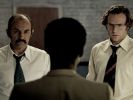Eye For Film >> Movies >> SUS (2010) Film Review
Two racist cops interrogate a young British-born West Indian man on the eve of the election night when Thatcher’s Conservative party came to power in 1979.
SUS isn’t trendy street slang, it is the informal name for the highly controversial stop-and-search law that allowed police to detain individuals on nothing more than suspicion (‘sus’). Barrie Keeffe, writer of The Long Good Friday, took one of the many cases of what amounted to institutionalised racism and very loosely adapted it for the stage in the late Seventies. This film was also written by him, adapted from his own stage play.

Keeffe expertly begins building a pervading sense of dread and unease, from the fake smiles and forced politeness that do little to hide the detectives’ utter contempt for their suspect, Delroy, to the way in which he gradually makes us realise that all is not as it seems. The whole film plays out in one interview room, leading suspense to build until the claustrophobia becomes almost unbearable. As though sensing this, director Robert Heath provides brief respite by way of blood-soaked flashbacks.
SUS is wordy, dialogue-driven and tough going. The slow-burning tension as we wait for the seemingly inevitable eruption of violence is palpable. And it is all sustained through dialogue that holds the audience in a vice-like grip – the images it paints are of a deeply troubled nation and the cyclical helplessness and hopelessness spawned by the plight of poverty stricken immigrants in Britain in the Sixties and Seventies. This is brought crashing home and is still as powerful, resonant and relevant a subject today as it ever was.
The performances of the three actors are all pitch perfect. As Delroy, Clint Dyer exhibits a real sense of dignity and humanity through his helplessness. Rafe Spall already played a highly unreasonable cop in Hot Fuzz – as Wilby, he shakes off the comedic undertones and goes all out to exude real menace under a too-thinly veiled sheen of disgust and smug detachment. Ralph Brown as the sadistic Karn effortlessly makes the blood boil as he calls his wife to enquire what’s for dinner, moments after he has relayed to Delroy the news of the man’s wife’s death.
At times the brutality of the psychological torture the pair inflict on Delroy threatens to detach the viewer and numb them to proceedings; though thanks to the flawless performances, this never quite happens. Instead we are plunged further into the dark, dank realms of institutionalised racism and all the blood-boiling fury it conjures.
The setting of 1979 indicates that with Thatcher’s Tory party consistently moving further right, issues of race and immigration are only set to get worse in Britain and remain at the centre of political debate for some time to come. With a new ‘Nationality’ Act just around the corner, despair looks set to prevail.
Grim, relentless, thought-provoking and powerful, SUS is not an easy ride - but then it shouldn’t really be, given the questions it poses and the dark, troubling themes it addresses head on and without relief.
Reviewed on: 05 Jun 2010



















